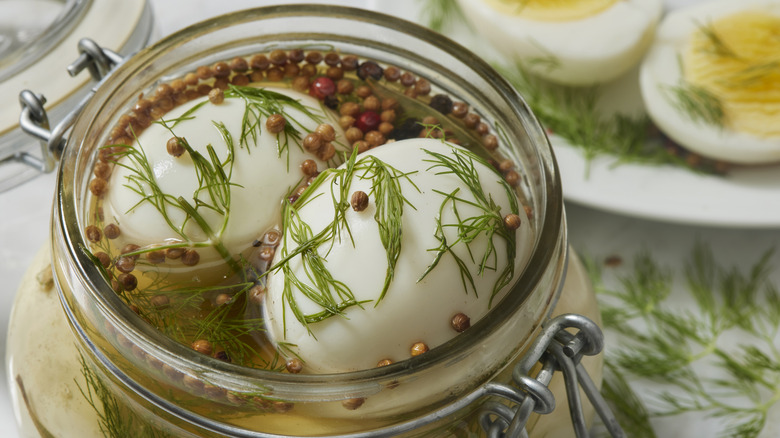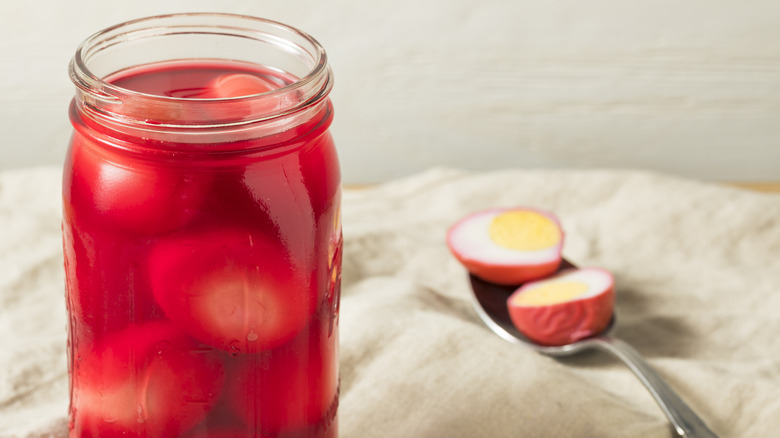How Long Does It Take To Pickle Eggs?
For some, pickled eggs are just too weird and too much of an acquired taste. However, they are popular snacks in old-fashioned pubs and some fish and chip shops around the United Kingdom as a sour accompaniment to a pint or some fries. And, they're ubiquitous in the American South, with gas stations and grocery stores stocking them in giant jars for your convenience.
Despite their apparent strangeness, pickled eggs fall into the same category as every other pickled thing, in that they came about out of necessity. If you had a surplus of cucumbers, beets, onions, or even eggs, you needed to preserve them instead of letting them go to waste; you can pickle just about any vegetable to enjoy summer produce in the dark winter months. Eggs aren't that different. To make pickled eggs, the eggs are boiled and peeled before being submerged in either a salty brine or a vinegary pickling liquid before being stored away. But, if you're considering making them, there is one question that springs to mind, as with all pickled foods — when will they be ready to eat?
Patience is needed before tasting home-pickled eggs
It takes between two and four weeks for the eggs to be well and thoroughly pickled, and they'll keep for at least three to four months, unopened, according to the National Center for Home Food Preservation. During that time they should be refrigerated at all times, as storing them at room temperature increases the risk for food-borne illnesses such as botulism. After opening, you should keep them in the refrigerator and eat them within two weeks. If the jar is out, it should be put away after two hours. Just be aware that the longer the eggs pickle, the darker they will become, especially if there are any colorful ingredients in the pickling liquid such as beet juice or turmeric.
Pickling eggs at home isn't without its risks — as is the case with pickling other vegetables in terms of bacteria. So be sure that all of your equipment is properly sterilized, which includes the cutting boards and knives you use to chop pickle add-ins, and follow the guidelines for proper sterilization of jars and lids.
Pickled eggs are actually super versatile
Eggs are good candidates for pickling because they're rather plain in flavor and take on other flavors very well. As with pickled vegetables, the pickling brine can be changed to suit individual tastes. Some add sugar for a hint of sweetness, but you can also include spices and aromatics like chili flakes, turmeric, bay leaves, or curry powder to the pickling liquid. You can even spice it up with firey peppers — jalapenos are a common addition. Beets are also sometimes used and the resulting flavor is earthy and slightly sweet, with an added tang from the vinegar. Just remember that anything you add to the pickling liquid will color the egg, so if you use turmeric or beets, don't be alarmed when you check on them in a few weeks to find them yellow or pink. You can also keep it simple with dill-pickled eggs, which use the same ingredients as dill pickles.
If you're curious about the taste but won't go so far as to seek a pickled egg out, the flavor is like an egg that's been mashed with some pickle juice, a combination that many people find polarizing: You either love it or hate it. If you happen to have a jar, you can use the eggs anywhere a hard-boiled egg would fit. Try them on top of a salad, mashed into egg salad, or even as deviled eggs. They're a good accompaniment for shots of ice-cold vodka, too.


